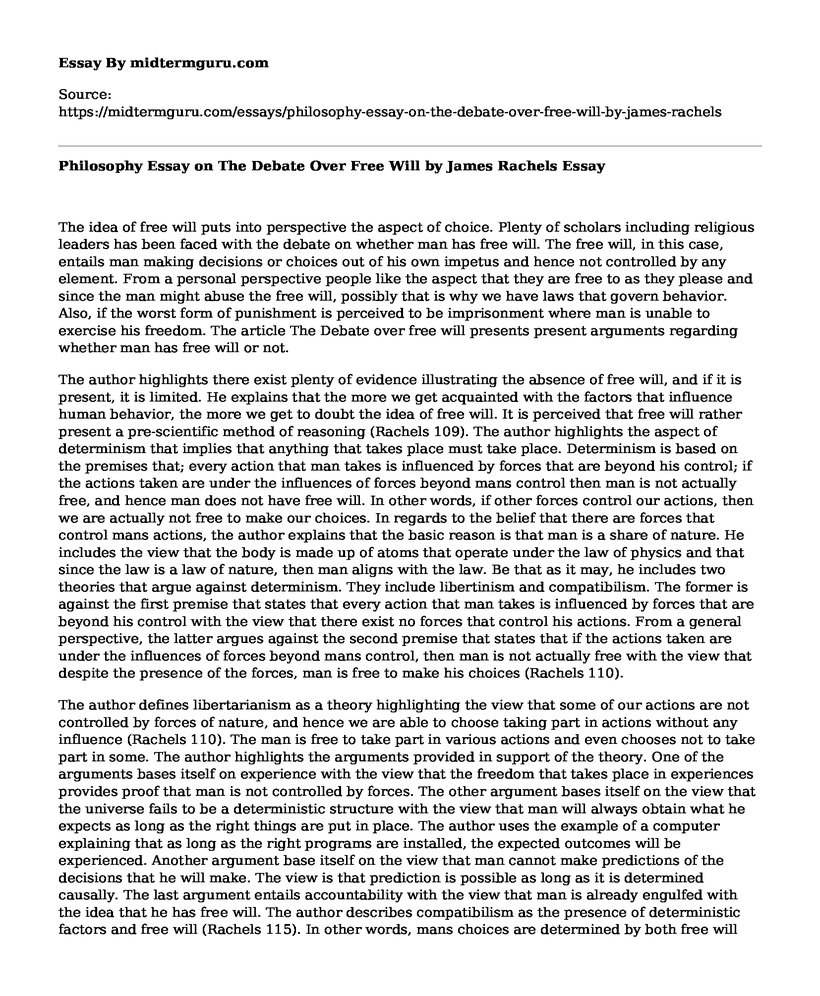The idea of free will puts into perspective the aspect of choice. Plenty of scholars including religious leaders has been faced with the debate on whether man has free will. The free will, in this case, entails man making decisions or choices out of his own impetus and hence not controlled by any element. From a personal perspective people like the aspect that they are free to as they please and since the man might abuse the free will, possibly that is why we have laws that govern behavior. Also, if the worst form of punishment is perceived to be imprisonment where man is unable to exercise his freedom. The article The Debate over free will presents present arguments regarding whether man has free will or not.
The author highlights there exist plenty of evidence illustrating the absence of free will, and if it is present, it is limited. He explains that the more we get acquainted with the factors that influence human behavior, the more we get to doubt the idea of free will. It is perceived that free will rather present a pre-scientific method of reasoning (Rachels 109). The author highlights the aspect of determinism that implies that anything that takes place must take place. Determinism is based on the premises that; every action that man takes is influenced by forces that are beyond his control; if the actions taken are under the influences of forces beyond mans control then man is not actually free, and hence man does not have free will. In other words, if other forces control our actions, then we are actually not free to make our choices. In regards to the belief that there are forces that control mans actions, the author explains that the basic reason is that man is a share of nature. He includes the view that the body is made up of atoms that operate under the law of physics and that since the law is a law of nature, then man aligns with the law. Be that as it may, he includes two theories that argue against determinism. They include libertinism and compatibilism. The former is against the first premise that states that every action that man takes is influenced by forces that are beyond his control with the view that there exist no forces that control his actions. From a general perspective, the latter argues against the second premise that states that if the actions taken are under the influences of forces beyond mans control, then man is not actually free with the view that despite the presence of the forces, man is free to make his choices (Rachels 110).
The author defines libertarianism as a theory highlighting the view that some of our actions are not controlled by forces of nature, and hence we are able to choose taking part in actions without any influence (Rachels 110). The man is free to take part in various actions and even chooses not to take part in some. The author highlights the arguments provided in support of the theory. One of the arguments bases itself on experience with the view that the freedom that takes place in experiences provides proof that man is not controlled by forces. The other argument bases itself on the view that the universe fails to be a deterministic structure with the view that man will always obtain what he expects as long as the right things are put in place. The author uses the example of a computer explaining that as long as the right programs are installed, the expected outcomes will be experienced. Another argument base itself on the view that man cannot make predictions of the decisions that he will make. The view is that prediction is possible as long as it is determined causally. The last argument entails accountability with the view that man is already engulfed with the idea that he has free will. The author describes compatibilism as the presence of deterministic factors and free will (Rachels 115). In other words, mans choices are determined by both free will and the laws of nature. The theory puts into perspective the issue of desire by which if a man makes decisions based on desire, he employs both determinism and free will. The author also highlights free will with the view that mans ability to reason such that he exhibits morality distinguishes him from other creatures (Rachels 118). The author states that the presence of free will makes it possible for man does not operate like a robot. He also highlights that the view of philosophers that the presence of deliberation indicates that man has free will and hence being able to engage in moral actions (Rachels 124). From the authors perspective, the presence of the thought that man has free will presents sense despite being an argumentative issue. It can be perceived that the author view adheres to determinism rather than a man having free will. His argument that the presence of the laws of nature makes man not have free will makes sense as every activity is controlled by our surroundings.
Work Cited
Rachels, James. The Problem of Philosophy. The Debate over Free will, 109-124, New York: McGraw-Hill Education, 2011. Print.
Cite this page
Philosophy Essay on The Debate Over Free Will by James Rachels. (2021, Jun 07). Retrieved from https://midtermguru.com/essays/philosophy-essay-on-the-debate-over-free-will-by-james-rachels
If you are the original author of this essay and no longer wish to have it published on the midtermguru.com website, please click below to request its removal:
- Kants Political Writings Essay: Categorical Imperative
- Eating Pork Is Morally Unacceptable - Argumentative Essay
- Revised Code of Ethics: Benefits for Professional Accountants in the US - Research Paper
- Plato: Advocating Morality, Righteousness, and Justice - Essay Sample
- Reflect and Define: A Professional Counselor's Path to Success - Research Paper
- Residents of Prinsloo vs Oil Refinery: An Ethical Dilemma - Essay Sample
- Article Analysis Essay on Homosexuality and the PIB Argument







